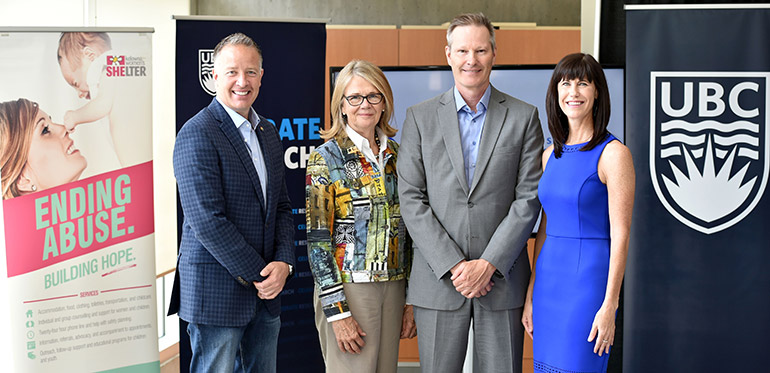
Announcing $1 million in funding for Supporting Survivors of Abuse and Brain Injury through Research (SOAR) are, from left, Kelowna-Lake Country MP Stephen Fuhr, UBC Deputy Vice-Chancellor and Principal Deborah Buszard, Professor of Health and Exercise Sciences Paul van Donkelaar and Kelowna Women’s Shelter Executive Director Karen Mason.
Million-dollar grant from Government of Canada funds unique research collaboration
The Government of Canada is providing $1 million to fund a unique research collaboration studying traumatic brain injury (TBI) in women who have experienced violence and abuse at the hands of an intimate partner.
Supporting Survivors of Abuse and Brain Injury through Research (SOAR) is led by Paul van Donkelaar, professor of health and exercise sciences at UBC Okanagan, and Karen Mason, executive director of the Kelowna Women’s Shelter, with support from several partner organizations in BC and across Canada.
“With this investment, we are funding the University of British Columbia’s Okanagan campus to support survivors and their families in Kelowna,” says Maryam Monsef, Minister of International Development and Minister for Women and Gender Equality. “The gender-based violence funding envelope was developed in partnership with leaders from the women’s sector, whose advice continues to inform Canada’s first Strategy to Prevent and Address Gender-Based Violence. Gender-based violence must not be tolerated, and we will continue to work with survivors, community partners, the private sector and other orders of government to end gender-based violence in all of its forms.”
“Our government is committed to addressing and ending gender-based violence in our communities,” says Kelowna-Lake Country MP Stephen Fuhr. “By supporting this important work, survivors of gender-based violence and their families will have better support and a fair and equal chance to live their lives free of fear and to the fullest.”
Considerable research has been done on concussions and the impact of brain injuries in athletes, but less is known about brain injuries among women who have been abused by their partners.
“Only a few studies have looked at the frequency with which survivors of intimate partner violence have also suffered a traumatic brain injury, but initial findings indicate the numbers are very high,” says van Donkelaar. “We’re really pleased to be able to contribute more to this emerging area of research in hopes of helping women who’ve experienced a concussion through intimate partner violence achieve better outcomes.”
Working in partnership with Kelowna Women’s Shelter to engage participants, van Donkelaar’s research team is measuring physiological changes such as blood flow or inflammation in the brain to better understand brain dysfunction in survivors of intimate partner violence. The team is also assessing survivors for emotional disturbances.
“Unlike with most young athletes who suffer a concussion, victims of intimate partner violence often experience post-traumatic stress disorder, depression and anxiety, so it’s important to measure and account for these factors in the research,” says van Donkelaar.
Mason says bringing together UBC expertise with organizations like the Kelowna Women’s Shelter in this sort of community-engaged research represents an important collaboration that is helping inform delivery of services for women who have experienced violence and abuse.
“Until very recently, agencies like ours that support women who’ve experienced violence have not really taken traumatic brain injury into account when training staff or providing support services, but this project is allowing us to develop specialized resources and training in the signs, symptoms and implications of concussion, and how to help women experiencing them,” she says. Resources will include an intimate partner violence module of the Concussion Awareness Training Tool developed by the BC Injury Research and Prevention Unit.
Thanks to this new funding, the research team will also now work to develop a community support network for women who’ve experienced intimate partner violence-caused traumatic brain injury.
“If we’re going to train staff at women-supporting organizations to identify signs of brain injury in their clients, and take a TBI-informed approach to their work, it’s critical we also identify, and can refer those clients to the help they need, whether it’s medical care, psychological counselling, or life-skills tools,” says Mason.
“Given women make up half the population, victims of intimate partner violence need to know we’re committed to increasing research into the impact of concussion beyond what we might see in athletes,” says van Donkelaar. “We know helping them achieve a healthy life, free from abuse, is good for all of us.”
Read the Government of Canada media release
About the research collaboration
The research project is a collaboration between UBC Okanagan, Kelowna Women’s Shelter, and a variety of supporting organizations, including:
- BrainTrust Canada
- BC Society of Transition Houses
- BC Injury Research and Prevention Unit, BC Children’s Hospital
- Women’s Shelters Canada
- Parachute Canada
- Department of Pathology, UBC Faculty of Medicine
About UBC’s Okanagan campus
UBC’s Okanagan campus is an innovative hub for research and learning in the heart of British Columbia’s stunning Okanagan Valley. Ranked among the top 20 public universities in the world, UBC is home to bold thinking and discoveries that make a difference. Established in 2005, the Okanagan campus combines a globally recognized UBC education with a tight-knit and entrepreneurial community that welcomes students and faculty from around the world.
To find out more, visit: ok.ubc.ca.